#ascended astarion analysis
Explore tagged Tumblr posts
Text
I might get some hate for this but I think people give the rite of profane ascension a little too much credit. All it did was amplify that which was already there. All the possessiveness, the theatric demeanor, the strange coping mechanisms, that's all Astarion. He had those traits already. The rite didn't have a personality baked in that possessed Astarion once it was completed. If you had finished the rite instead, it would act differently.
Astarion, after getting unfathomable power is going to do the one thing he knows he can. Be the biggest prick on the sword coast lol. He thinks himself untouchable now so he's going to rub it in the face of anyone in the vicinity.
Something else I find really interesting. When not romancing Astarion it is MUCH easier to talk him down from going through with it. Alot of his desire to complete the ritual comes from fear of losing the one person he cares for. So the ritual corrupts that too and turns it into possessiveness. It was already there.
"Ask me anything, and it will be yours".
But he also establishes a clear dom/sub type dynamic. I think because it's what he has known the most and is also maybe a liiiiiitle drunk off the power still. Which isn't everyone's cup of tea. So post ritual Astarion can quickly become very uncomfortable for people. But it's not necessarily "new" or Cazadors personality baked into the ritual. He has always had the potential to be like this. Even without killing over 7000 people. That's what makes his character analysis so fascinating. A!A and spawn Astarion are so detailed and well written and analysing them both just makes me realise how much work was put into these companions.
One more thing I'd like to mention. Aside from the occasional difference in wording or his greetings, most of his voice lines are exactly the same. It's still Astarion. And of course this is due to resource management but I also think it works as being intentional as well. He's still in there. He's just really lost in the power sauce at the moment.
Do I think ascended Astarion is the "better" ending? Objectively, no. From an RP standpoint, maybe! I think almost every companion has an arc where lust for power or blind devotion becomes their downfall. Even Durge! It's what makes them such compelling characters.
#baldur's gate 3#bg3#bg3 astarion#astarion ancunin#baldurs gate 3#astarion#ascended astarion analysis#romanced astarion#astarion baldurs gate#ascended astarion
733 notes
·
View notes
Text
It’s no secret Astarion hates himself. Like he deals with a lot of insecurities and self loathing. He just puts on an act of self confidence and narcissism to properly play the role of sexy vampire.
But I think a lot of people miss when he Ascends this gets so much worse. Not only does he still think he’s only good for sex and has nothing to offer beyond that. Now he’s a monster, not by force but by choice. He choose to become a monster. Now he’s expanded his act from sexy vampire to evil sexy vampire. He’s playing the villain because that’s what he thinks he is. And as we know he’s really not that great at acting.
I think it’s interesting everyone always talks about seeing through Astarion’s facade but when it comes to him ascending they’re so quick to fall for his act all over again.
There’s the line “if you stay with him he will always see you as degrading yourself” in his post ascension romance scene. A lot of people interpret it at face value as he hates and looks down on Tav. But I think it’s miss understood because he could never hate Tav as much as he hates himself. Infact I’d say he has Tav put up on the highest pedestal. He sees them as the kindest most caring person in the whole world. He adores them and holds them in the highest regard. That’s why them wanting to be with him so much they would even put themselves beneath him is the ultimate degradation. It’s also why he feels he has to turn them because he doesn’t believe there’s any reason they’d choose to stay with him of their own free will while at the same time he can’t bare to loose them. He can’t wrap his head around the idea that you could actually love a monster like him.
If you say you want freedom in the reunion party he panics. Why would you want freedom? To leave him? You want to leave him? Why? When he’s given you the only things he’s good for; luxury and sex. That’s the only reason you choose him in the first place. He’s desperate to make Tav happy. With out Tav he has nothing. He is nothing.
He hides his hurt and insecurities behind that mask of the villain, behind his facade of power and dominance. Under it all he’s still the frightened spawn cowering in the kennels. And there’s no one he’s more desperate to hide this from than Tav lest they realize their mistake of caring for him and leave.
#astarion analysis#bg3#baldurs gate 3#baldurs gate#astarion#bg3 astarion#baldurs gate astarion#ascended astarion#astarion ancunin#lord astarion#bg3 analysis
643 notes
·
View notes
Text
Astarion – and the image we expect to see when we think of a victim.
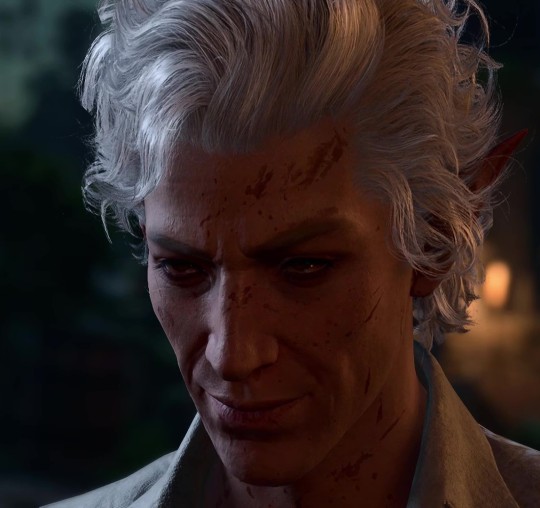
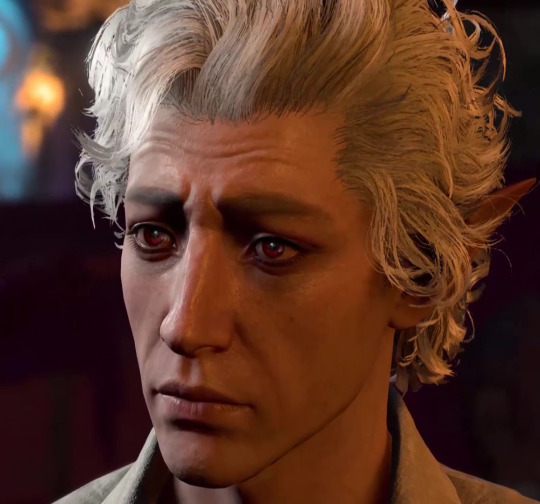
No, this isn’t meant to be a plea for you to stop hating Astarion.
This isn’t a "But look what he had to go through! Go give him the world”.
This is meant to show how different victims of violence can be – and how arbitrary it often is when we choose to feel compassion, and when we don’t.
Let’s take the same trauma, the same environment – but two different personalities experiencing it.
there will be two different pictures of a person
Victims are different. Just as different as all of us are.
Astarion’s life changed in an instant. One moment, he was a magistrate walking home. The next, he was a vampire locked in a cell. Hunger. Violence. Prostitution.
Constant surveillance, judgment, punishment. Torture. Rape. Watching others suffer the same.
Love and compassion – forbidden. No one to help. No way out.
Two hundred years.
If you try to imagine that, try to picture yourself in that situation – it’s unimaginable.
And injustice like that exists in the real world too. Children. Women. Men.
So why do some people feel no sympathy for Astarion?
Because he’s mean – and that means he deserves it
Because he doesn’t act like a victim?
– not like the victim we imagine in our heads.
And this happens in real life too.
⚠️ Trigger warning: SA and child abduction
Those who know the case of Natascha Kampusch – a girl abducted and kept in a man’s basement for eight years, who escaped – may also know that she was demonized in the Press.
And why? Because just days after her escape, she gave an interview – and she didn’t cry.
She didn’t look broken, fragile, or psychologically shattered. On the contrary: she sat upright, calm.
This isn't how we imagine a victim. In our minds, the conclusion could be, 'they couldn't have found it that bad.' maybe it is a bad person themself
But here’s what we need to understand:
People react differently to trauma and danger. Fight or flight. That’s instinct.
We develop different coping mechanisms – also instinctively. In moments of extreme stress, our subconscious kicks in to protect us.
Sometimes it makes us feel nothing. Sometimes it makes us even laugh.
It tell us, it's not that bad. We adapt, try to align ourselves with the abuser to survive.
This even happens in hostage situations (Stockholm Syndrome).
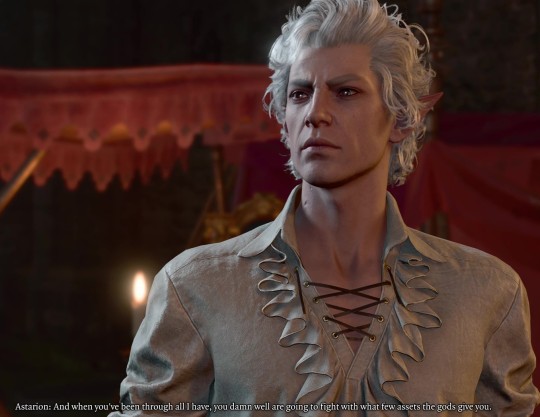
Astarion survived 200 years of unspeakable evil.
His coping mechanisms are incredibly strong.
But our idea of a “real” victim is someone who cries, rocks back and forth, and needs comforting.
Real victims, however, often had to learn to be so strong that no one – no one – sees how vulnerable they really are.
Which only means they endured far more than any human mind should ever have to.
And i think we don’t have to see him as a victim. Or what a victim should be Like.
We can see him as a fighter – one who finally, after all this time, is allowed to lay down his weapons.
#tw abuse#the perfect victim#astarion#baldurs gate 3#the pale elf#Trauma#astarion analysis#ascended astarion#spawn astarion#astarion art
218 notes
·
View notes
Text

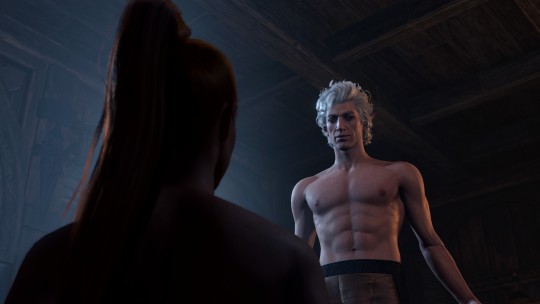
I have always perceived the act of kneeling in the scene where Tav undergoes the transformation into a spawn not merely as an act of submission, but as a kind of oath-taking ceremony. In D&D lore, vampires possess a lawful evil alignment, which is inseparable from strict principles of hierarchy. Astarion calls Tav his consort, emphasizing not only his power and status but also Tav's crucial role in his plans. This also symbolizes their union within the framework of vampiric hierarchy and the new life that will begin after Tav's transformation.
Consort is a title traditionally used to refer to the spouse of a monarch. In the context of a royal family, a consort does not hold the rights of a ruler but serves as an important figure in public and state affairs.
It is particularly noteworthy that it is right after the night of the turning that Astarion first calls Tav his consort, which I personally cannot see as mere coincidence unless he intentionally imbued the event with ritualistic meaning. Such wording is undoubtedly steeped in an aura of regal solemnity, which is especially remarkable for Astarion, given his yearning for grandeur and liberation from his former subordinate position.
When Tav knelt before Astarion, I was reminded of the painting «The Coronation of Napoleon» by the French artist Jacques-Louis David. The painting depicts the moment when Napoleon Bonaparte crowns his wife Josephine during the ceremony held in 1804 at Notre-Dame de Paris. Napoleon stands on an elevated platform in his imperial attire, including a luxurious cloak trimmed with ermine, as he places the crown on Josephine's head himself.
Meanwhile, in the developer's note to the animation tag for this scene in the game, it says: «Tav kneels before Astarion. Astarion stands proud before the Player. He is powerful. He is free.»
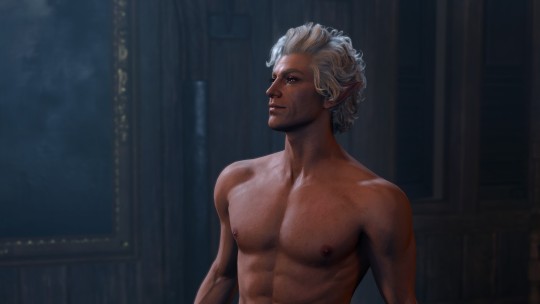
I have no doubt that Astarion was indeed imbuing this moment with a special ritualistic meaning. He wants Tav to acknowledge his supremacy by kneeling before him, as if it were an oath-taking ceremony. This is not just an act of dominance but a kind of ritual with profound cultural and historical undertones.
Undoubtedly, this scene is filled with clear eroticism, which perfectly aligns with Astarion's love for decadence and theatrics. I find this quite amusing, and I'm sure Astarion also enjoyed playing with this subtext, giving the moment a particular sexual tension and sharpness. All of this comes together in a quirky pattern, creating an exceptionally rich scene where cultural and erotic motifs intertwine.
Kneeling is a gesture that carries a variety of meanings depending on the cultural, historical, and social context. It is commonly associated with expressions of respect, submission, devotion, or acknowledgment. In a religious context, kneeling symbolizes reverence before a higher power, humility, or repentance. For example, in Christianity, people kneel before an altar or during prayer. In some religions, the gesture signifies a plea for help, mercy, or forgiveness. In a monarchical context, kneeling has been used as part of rituals such as knighting ceremonies or being admitted into the circle of royal privileges. In the feudal context of the Middle Ages, vassals knelt before their liege lord as a symbol of loyalty and submission. This act was often accompanied by kissing the hand or a symbol of authority (such as a sword or crown). In a romantic context, kneeling is a gesture symbolizing a marriage proposal, as well as an expression of respect, admiration, and love.
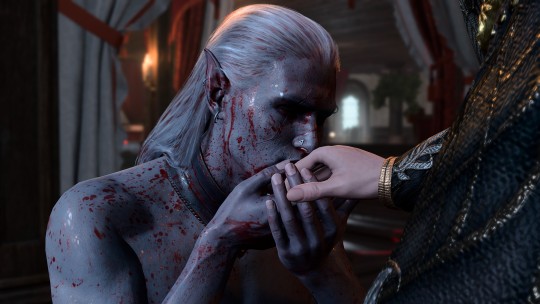
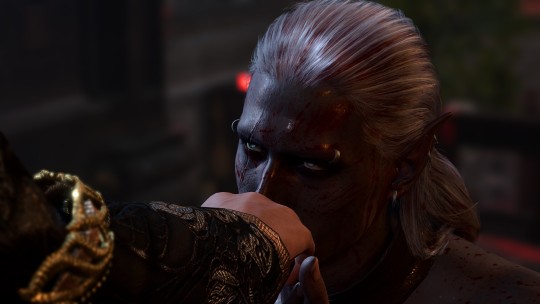
For myself, I highlight the following:
Acknowledgment of sovereignty — kneeling before a monarch symbolizes submission to the authority of the crown and recognition of its legitimacy.
Acceptance into the circle of royal privileges — in this context, the act can be interpreted as a ritual of initiation, where kneeling marks entry into an exclusive circle, granting access to the advantages and status associated with monarchy.
Astarion perceives himself and Tav as something superior to all other beings, stemming from the fact that Tav becomes a vampire. He believes that the transformation of Tav into a vampire grants them the opportunity to become "something more," elevating them to a new level. This transformation not only makes Tav a vampire but also symbolizes their entry into a special, elite category of beings who possess power and authority beyond the reach of ordinary mortals or other creatures. For Astarion, as a vampire, this means that Tav can now share in his greatness.
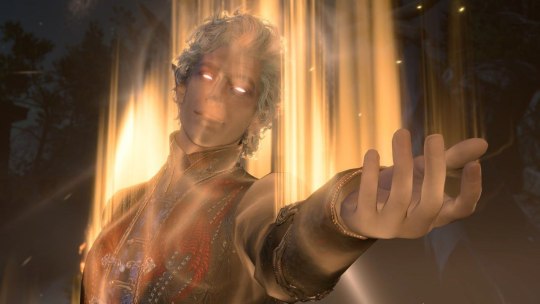
Astarion: You are stronger now. Better. You will thank me one day, I am sure. Astarion: You will be stronger, swifter, sharper, but you won't be different. You were already perfect before. It's hard to improve.
An expression of respect and devotion — such a gesture underscores reverence for the monarch as a divine or political symbol.
Kneeling as an act of humiliation:
In Astarion's thoughts, one can discern that he views Tav’s decision to stay with him and become his spawn as something indicative of degradation, perhaps even moral decline.
When Tav agrees to become Astarion’s spawn, it can be interpreted as a conscious act of self-sacrifice, where they relinquish equality in the relationship and willingly submit to him. This step symbolizes the rejection of personal autonomy and the acceptance of absolute dependence. Tav entrusts their life entirely into his hands. Astarion: You have given me everything. Thank you.
Astarion likely perceives such a decision as a form of "degradation," believing that a normal person, from his perspective, would not make such a choice. He tries to understand why Tav would do this and concludes that Tav derives a certain satisfaction from such a dynamic, perhaps even having an inclination toward it. Narrator: But perhaps you wish to degrade yourself. And he knows it.
This explains his surprise when Tav, contrary to his expectations, asks for tenderness. It’s simply not what he anticipates. His reaction reveals confusion and forces him to reassess Tav’s motives, as such a request goes beyond the scenario he had envisioned.
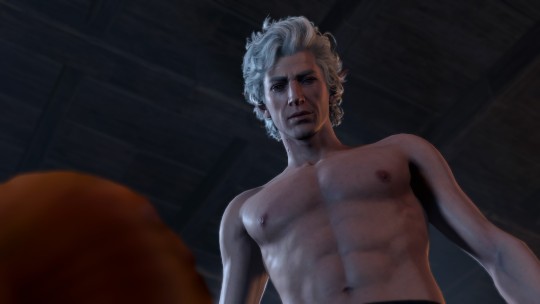
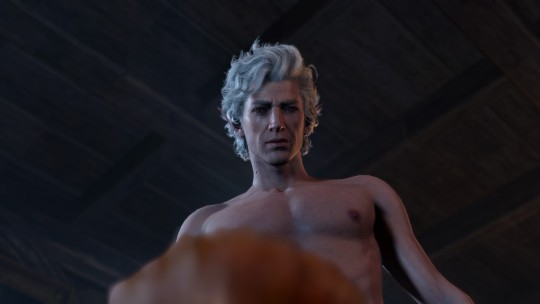
Astarion: So, tell me what you desire. What can I do for my dearest pet? Player: I want you. I want your body. Astarion: You've earned it. But don't you want more - don't you want eternity? One more bite is all it would take. As for Welch's remark that Astarion "won’t respect you," this narrative only applies to the phrase "I want your body," which itself is not required in the game. This line adds an interpretative layer but is not central to all the possible interactions between Tav and Ascended Astarion.
Baudelaire Welch: He's literally looking down on you because you are someone in that situation who believes you deserve sex as a reward. He will give it to you, but he won't respect you.
In essence, the entire narrative about the sexualization parallels the scene with Araj in Act 2, where the player asks for sex as a reward for defending Astarion before Araj or helping with Yurgir's murder. And although Welch desperately tried to impose this motif in the Ascended route, limiting roleplay, it is not the only one, and far from the most obvious. There are other reasons to help Astarion with the ritual, and even he is aware of them:
Astarion: Of course I understand love. All too well. The gravest crimes committed in this world are committed for love. A hunger crueller than bloodlust.
Many also overlook that Tav's consent to become his spawn is seen by Astarion as an expression of exceptional trust and devotion. His gratitude the following morning confirms this: he sincerely expresses appreciation for the trust shown in the very first phrase he addresses to Tav. Astarion: You are so beautiful... And you will be beautiful forever. Thank you for trusting me. Moreover, trust becomes the leitmotif of his dialogues afterwards, especially when their relationship with Tav is questioned or criticized by their companions. Each time, he emphasizes that their relationship is built on this foundation:
Karlach: You know, Astarion, I'm not sure I can trust you anymore. You're… different. A bit scary, to be honest. Astarion: I have one person who trusts me completely. That's enough for me. Lae'zel: You have shared your new power with your lover, Astarion. I'm surprised - I expected you to turn your back once you got what you wanted. Astarion: Quite the opposite - I need someone I can trust. And now I know they'll never betray me.
Unfortunately, in the kiss scenes of Patch 6, the original context was lost, and the focus shifted to themes of fear and humiliation that were not present in the original dynamic with Ascended Astarion. Considering that the kiss scenes were based on the scene of Tav’s transformation into a spawn, which is almost obvious, their emotional tone was distorted. For example, initially, Tav knelt entirely of their own free will, which emphasized the intentional and voluntary nature of their decision. In the kiss scenes, on the contrary, Tav is shown kneeling out of fear, the source of which remains unclear. Throughout the game, it is never shown what consequences Tav could fear for refusing to do so. In the transformation scene, Tav can refuse and not face any frightening consequences.
It also seems illogical when Tav is frightened when Astarion grabs them by the throat. This contradicts the transformation scene, where Tav themself initiated it, asking Astarion to hurt them and even tilting their head back, exposing their neck.
Astarion: It will only hurt a bit, the pleasure will be far greater than the pain. Player: Oh, come on. Let it hurt.
In the kiss scenes, however, this dynamic, based on mutual consent, was changed to an act of violence. This further exacerbates the inconsistency, especially considering that in the original script of this scene, it was noted that both Tav and Astarion derive pleasure from what is happening.

In dialogues, Ascended Astarion also demonstrated a willingness to be tender with Tav when Tav expressed it through words. He was not solely focused on rough dominance, as was attempted to be imposed in Patch 6. This change is likely an attempt by Larian to please the audience who, without going through the Ascended route and without understanding its nuances, actively promotes the narrative of the collective majority about the cycle of abuse.
Yes, the facial expressions in the kiss animations were changed due to fan requests for the Ascended route, but the aftertaste and consequences of these changes remain.
Some players still argue that facial expressions in role-playing games should be imposed "for the sake of the great narrative," while others use game conventions, such as cyclicality of animations, to demand the return of scared expressions. However, bringing back this dynamic would undermine the story and the character that fans of Ascended Astarion have known and loved for six months after the game's release.
In my opinion, to expand the role-playing experience, it would be much more useful not to return the scared expressions as an option, but to add the possibility for the lord to use more standard kisses, similar to those in Patch 5.
It is unclear why many are convinced that the vampire lord is incapable of tender kisses with Tav when his love scene demonstrated just this tenderness, and the moment with the kiss on the hand is one of the most refined and delicate romantic episodes. In particular, the kiss on the hand, which happens after the "be gentle" option is chosen, not only emphasizes Astarion's attention to Tav's desires and his willingness to listen, but also contradicts the notion of his exclusively dominant and cold nature.

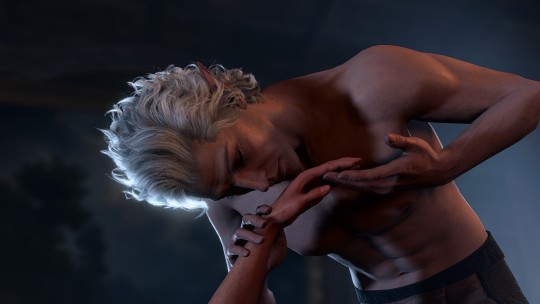
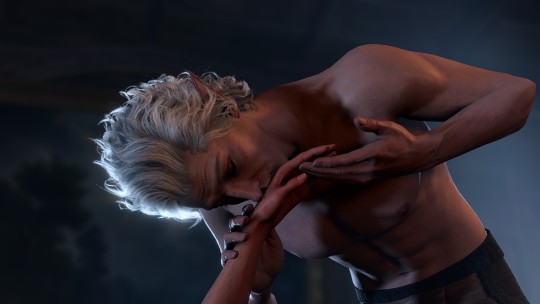
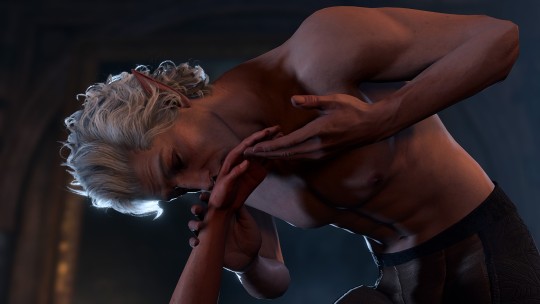
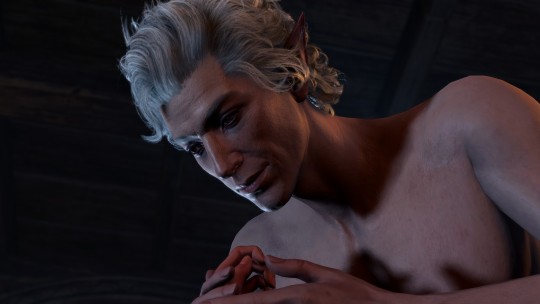
If Astarion is capable of expressing such tenderness in intimacy, why is it excluded that the same softness could be maintained in his kisses?
The kiss in Patch 6 would only make sense if, upon choosing the "be gentle… if you can" option, Astarion ignored Tav's request, and his actions were no different from those in the "let it hurt" option.
I would also like to draw attention to the sharp contrast in Tav's facial expressions in the bite scenes, written by different writers. In Act 1, when Astarion was written only by Stephen Rooney, Tav's facial expression shows ecstasy, and this same expression is repeated in the lord's love scene, which, according to Welch, they did not write.
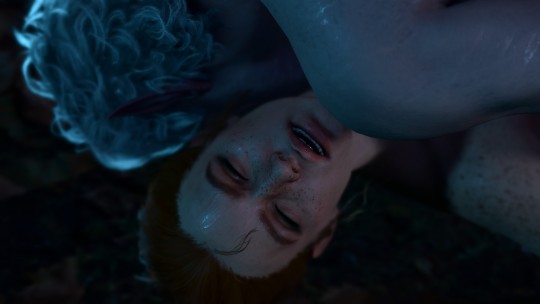
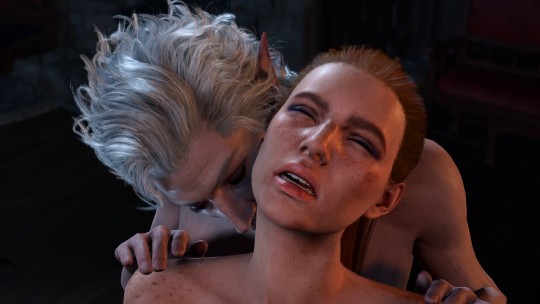

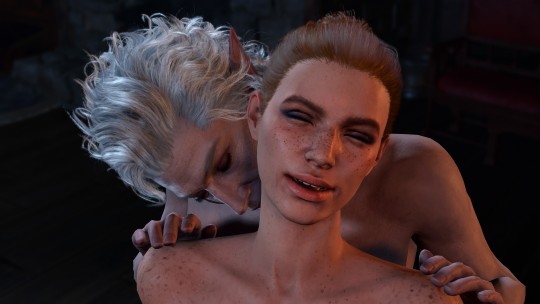
However, in the transformation scene, which, as Welch confirms, was written with their involvement, Tav's facial expression is noticeably different.
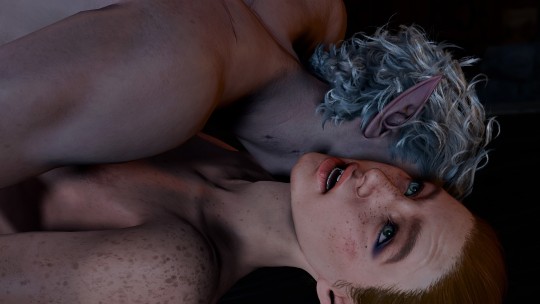
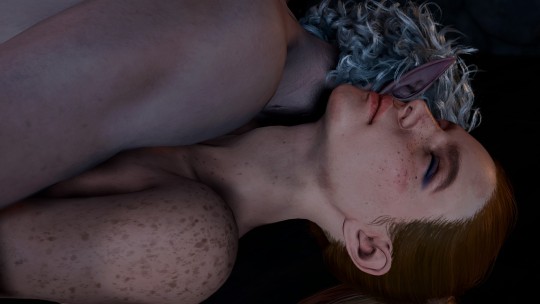
It’s not fear, like in the kisses from Patch 6, but the expression conveys a "problematic/kinky" mood — a term that Welch themselves used to describe this scene. This looks particularly strange in the dialogue where Tav explicitly asks to be hurt:
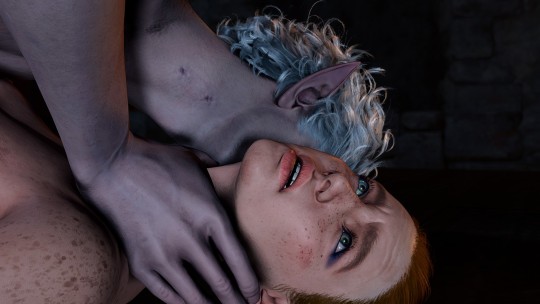
Astarion: Shall we have one last night together before you join me in immortality? One for the road, so to speak. Player: We shall not. I just need you to bite me. Astarion: Impatient are we? Well who am I to deny you?
This suggests that Welch’s views on "kinks" are at least debatable, and this influences how they are portrayed in the game. For example, Welch sees the transformation into a spawn as an "irreversible sex-pact/kink/form of gratification," but Tav's reaction in this scene is somewhat more uneasy than in previous episodes involving similar actions.
Both scenes are consensual, but they have a different tone simply because one of the writers condemned the player for "kinks," while the other did not.

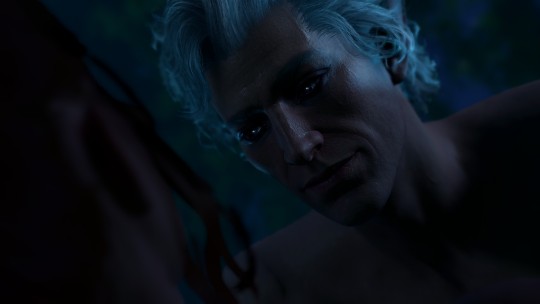
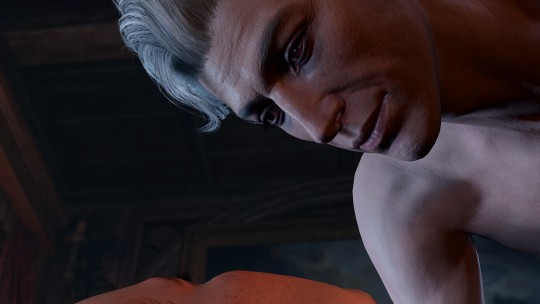
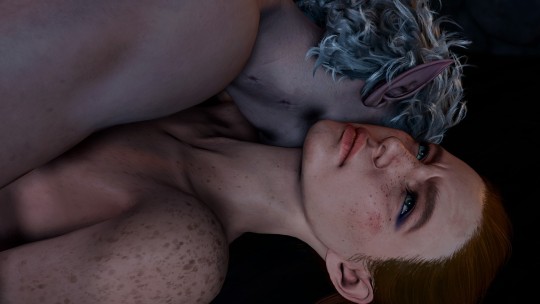
In the cinematic context for the transformation scene, the following was stated: "You are naked and vulnerable before him." This feeling, it seems to me, is what the animators tried to convey and embody, capturing the intimacy of the moment. However, with the release of Patch 6, this message became distorted, turning into something entirely different — crude and devoid of the original subtle undertones.
In this context, I believe that the kisses from Patch 7 appear much more consistent compared to the facial expressions in Patch 6.
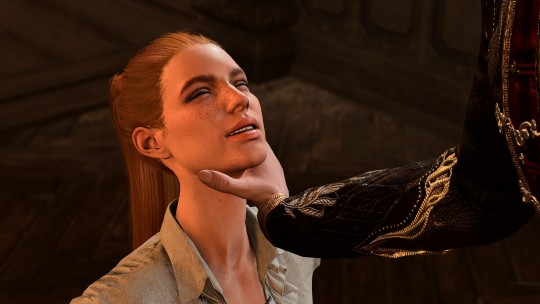
Especially when considering the following points:
Astarion grabs Tav by the neck solely at the player's initiative, and the dialogue clearly implies that Tav wants this.
Tav has previously reacted with obvious pleasure to similar actions by Astarion in other scenes.
I genuinely do not understand why Baudelaire Welch's contribution should be considered more significant, given that they joined the project during the later stages of the game's development. Especially when you consider that the character was originally created by another writer, who laid the foundation for his personality, story, and key traits. Prioritizing late additions that distort the original concept seems unfair and disrespectful to Astarion's creator and his vision.
At this point, I would like there to be an option in the game to kiss Astarion's hand. A hand kiss is also a symbolic gesture that conveys respect, devotion, submission, and acknowledgment of power or authority. I find this incredibly romantic, and I truly miss it. It would further emphasize the symbolism of this route.
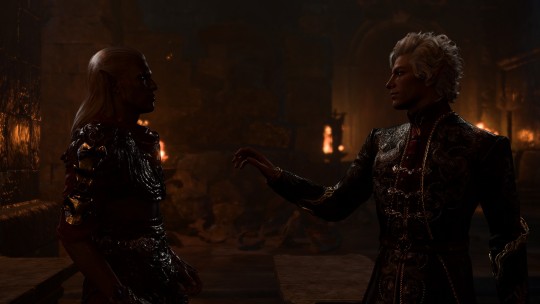
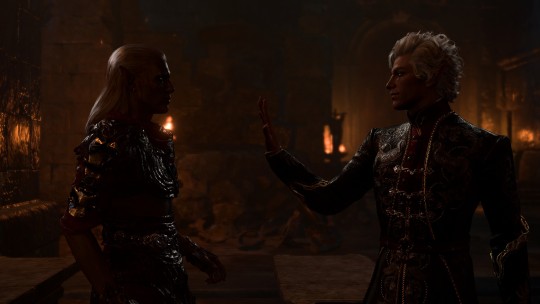
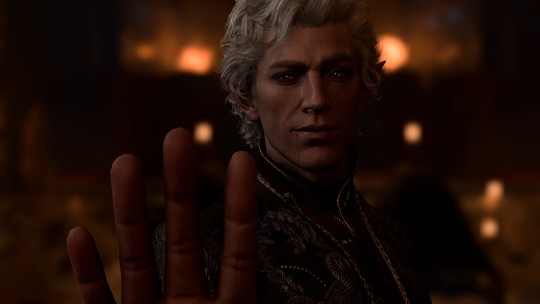
#baldur's gate 3#baldurs gate 3#bg3#astarion#astarion ancunin#bg3 astarion#ascended astarion#astarion bg3#astarion romance#astarion x tav#astarion x durge#astarion analysis
303 notes
·
View notes
Text
Ascended Astarion reaction to “I'll do it. I'll become a mind flayer”.
One of the interesting moments in Astarion's Ascension arc – in scriptural and cinematic point of view - is when Tav informs Astarion that they is not afraid of becoming an illithid.
(for Astarion, illithids are “it”. Justified by lore they lose all personality when they become one, except in the rarest of cases, it's Illithid roulette where the chance is far from 50\50)

Astarion clearly expresses that he doesn't want this and partly in an ironic (sassy) way.

And then this happens:
NodeContext: Trying to be assertive, but faltering

He looks at Tav straight in the eye, but then he thinks for a second, “if not… If it's unavoidable”. puppystaron
A whole body language here is just as brilliantly done.
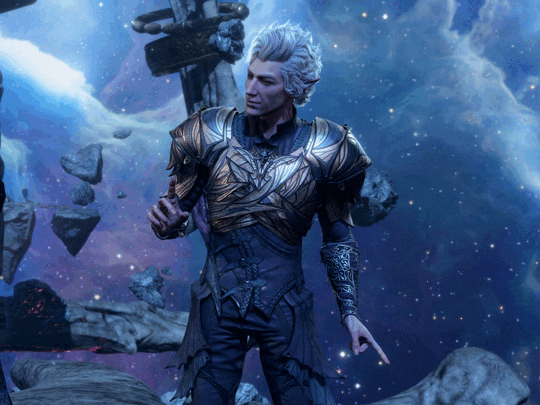
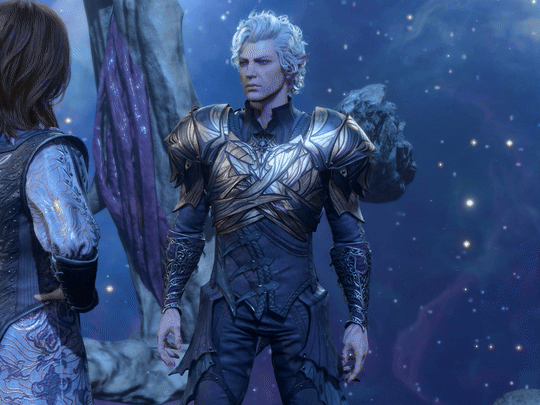
There are many gestures in this scene before these two phrases, he suggests using the hammer with a pointing gesture “look, we have this other option.” But I'll focus my attention on these two. In the beginning Astarion “indicates”, he wants to show authority and say “no” clearly, then he “crosses out” in the air with his index finger such a suggestion, clenching the fist of his other hand. He's also outraged - he waves his arms around - no, no this all won't happen. That's his emotion. Then he realizes that it is simply impossible to say “no” to this, it is necessary to solve this problem, Astarion opens his palms as if to say “wait”, “then we will think”. Here, too, he wanted to be confident, assertive. And this is his faltering moment, his left hand clenches a couple times for seconds. Realizing that he's confused he wants to pull himself together, clenching both fists again already from his desire to be firmer, confident.
“We'll figure it out. I am sure”.
Next part main analytics of what he's talking about and how deep it is.
He's faltering exactly on the word “I”. Maybe it's here because: And who am I? A worm, weak and pathetic - who never amounted to anything. Astarion heard this throughout the 200 years of his torment. Cazador had insinuated it to him all along - the helplessness and doom of his condition. He's used to a position where he just has to resign himself to it. It's the aftermath of his deep wound.
And then it clicks “no”. We won. Cazador is dead. And I am Lord. We'll figure it out. “I am sure of it”.
He wants to, very much, his feelings here play colors and all the developments that have taken place. But the practical side of the situation… which he realizes inside makes him have feelings and think thoughts he would never want to think about - loss. And what kind of loss? His love.
I've written about the “We” part of the big analytics here before. Astarion uses it many times. This moment is special and precious because he uses "We" in a stressful and dangerous situation, when his confidence after a grand victory and freedom is suddenly shattered again. And his wound is open.
Astarion is used to no one helping him. His usual phrases are “trust no one”.
I remember in situations of danger, he showed only distrust that anyone could help him except himself. That's quite a lot.
When the emotional contact happens in act 2 his feelings with Tav become deeper and true. (although in Act 1, Astarion felt something that was just building up to wanting real and more)
This moment is important because:
- he expresses his “I”.
- that he doesn't just say “We” when he's proud and puffed up. “We rule, we are beautiful.” He says “We” when a problem needs to be solved. That's what makes this We special. And under stress that he's even stuttering (!). It's a huge step, as if to say, he doesn't push Tav away, his first thought on how to solve this problem - relies on us. It's also a comfort to him. In addition, his tone becomes very soft - he's trying to calm Tav down so they can figure something out, too. Including “wait” gestures are the soothing “take your time, calm down, we'll think about it” movement.
As soon as he felt the pain from his wound, he remembers the most important. It's his trust and confidence in each other.
We can do it together.
At the end, I suggest enjoying Astarion against a backdrop of blue space nebulae.
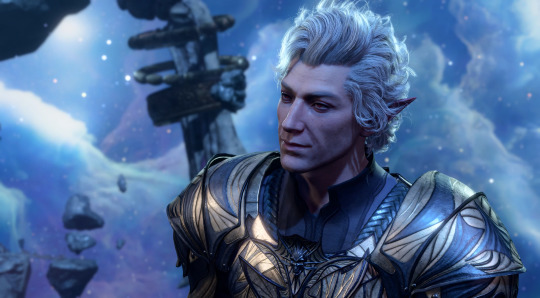
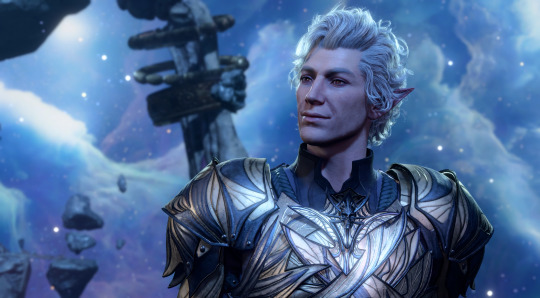
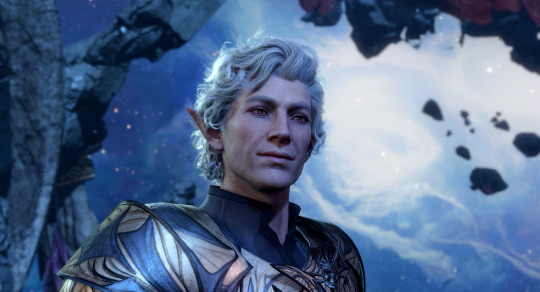
#I think that's even more than I wrote#because Astarion is a vast cosmos#astarion#astarion analysis#astarion meta#lord astarion#ascended astarion#astarion ancunin#bg3 astarion#astarion bg3#astarion baldurs gate#astarion romance#astarion x tav#astarion x durge#bg3#baldurs gate 3#my analysis#bg3 meta
149 notes
·
View notes
Text
Why I can never make myself ascend Astarion in my own playthroughs: AKA, I'm a sappy sucker (pun realized but not intended)
Also surprise TW: for ED I didn't think we'd get there for this but somehow we did. Nothing graphic or anything.
To me, Astarion's entire narrative feels like it seeks to answer the question: is he enough like this? Is what he can offer, moodiness, sexual trauma, centuries of abuse rattling around in his brain, confined to the dark- is that really enough for you? What else does he have to offer but his burdens? He even says as much if you break up with him in act 3 before fighting Cazador.
He doesn't think he DOES have anything to offer you. He doesn't really see just how much good there is left in himself, every piece of gentleness, kindness, softness, all of that was made to feel like his own weakness by Cazador who was made to feel that way himself by his own master.
Because that's how I see his storyline, it makes ascending him feel like saying "No. You're not. You will never be enough as you are, this is the only way, you're right."
Which is why you need to convince him, not to give up something he wants, but that you already think he IS enough. That he can be better than Cazador, not by becoming what Cazador sought to become, but by being the best parts of himself that have come through on your journey. Ascended Astarion is the way he is, in my opinion, because for all that power he now KNOWS (or thinks he does) that those parts of himself were worthless.
I also think it's very telling the way his approval works in the scene where you're convincing him not to ascend or helping him to do it.

(I LOVED this entire video btw, if you're hopelessly addicted like I am you might have already seen it but I'll link it jic)
youtube
When you get to the big moment, Astarion approves of being convinced not to go through with it, and interestingly he disapproves at the same time. But that math still works.
+3-1= +2
I feel those numbers in my SOUL every time someone validates me. I approve, because I want to believe it, I would like to think those nice things people who love me say... But I also disapprove. Because I don't believe them, not yet, even if I really want to.
It's the difference between someone helping you hide your dinner in the midst of an eating disorder and the people who tell you there is no reason to do that to yourself. You might appreciate both, but one is harder to hear, it takes more convincing, and it's also so much better for you if you listen to them.
However much the ritual probably does fuck with him and his soul and all that magicy stuff, I think I can honestly see a lot of just being... fear. Like he's always had, but now he has to pretend that it worked, that all the fear is gone, because he knows nobody, not even you, wants to see him as the spawn who wasn't enough without this profane power.
I don't know if anyone else really sees it that way, I know plenty of people love ascended Astarion but he breaks my heart. It feels so tragic. It doesn't feel like kinky roleplay, it just feels like him killing whatever softness he had left in him because he's afraid of it.
It feels like opening your heart to someone and saying "I don't think I'll ever be good enough unless I become everything my abusive controlling father told me I should want to be." and they look you in the eyes and say, "You're right."
And I can never ever bring myself to do that to him, not when I've dedicated so much time to the playthrough by that point. 😅 I'll take my little ascended Astarion clips and enjoy some of the fun dialogue he gets like anyone else but I will never be convinced ascending him is even remotely a happy ending.
(Also P.S: I understand evil playthroughs and stuff exist and you're not evil if you enjoy them/ or if your interpretation of AA is different for that matter, but I ammmm just not in a place where I can stand to feel like the world is any worse than it already is you know what I mean? Lol)
#ascend astarion critic#astarion ancunin#astarion#bg3#baldurs gate 3#bg3 companions#bg3 analysis#astarion analysis#ascended astarion critical#Youtube
83 notes
·
View notes
Text
You all know A Astarion's epilogue outfit, but have you ever wondered whether it's bats or dragons? Me and @egooppidum were wondering that today and we came to the conclusion that it's 100% dragons. The symbolism is SUPERB. Hats off to Larian for this.
Brace yourselves this might be a bit long ~

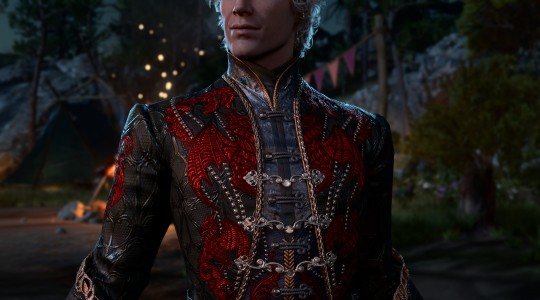
"Red dragons are covetous, evil creatures, interested only in their own well-being, vanity and the extension of their treasure hoards. They are supremely confident of their own abilities."
"Rarely, red dragons would adopt a protective yet patronizing manner towards creatures they saw as inferior that lived within their self-imposed borders" - Oh you precious dark consort, how lucky you are to have the greatest vampire lord as your master, for him to bless you with his eternal gift, turn you into his spawn, his right hand.

"Red dragons believed that if a being was not strong enough to protect what it had, then it did not deserve to keep it. This applied not just to treasure, but to life. They despised weakness among their own kind." Literally ANY line from him when he talks about his former 'weak and pathetic self'.

Him being obssessed with power and how that's the only important thing in this world. This would be huge if I added all of those lines tbh.
"Red dragons were known for their swift and fiery tempers—if angered, they would explode into a destructive rage and become even more impulsive and vengeful" - Practically his entire dialogue when you break up with him after the ascension or declining to become his spawn. Even subtly threatening you

"Such rages were in part due to their fragile pride and feeling that any loss, insult, or defeat meant a loss of status if not addressed—causing chaos and destruction assuaged wounded pride and mitigated lost status" - He sees himself as the best version of himself right now and the fact that you reject him, in any kind of way wounds him greatly. This is why he starts hurling insults at you, to hurt you back, to try and cover up the fact that you just shattered his ego
"They were the most avaricious and were constantly looking to expand their hoards with treasure, they were the most obsessive collectors." Recall how he calls you his treasure and how you’ll be together forever, he will have you forever. He is in fact obsessed with wealth. He would also like to sequester you in a deep chamber in his lair, I mean palace and keep you all to himself.
"They would also boast about their magnificent hoards." Him at the epilogue party. ESPECIALLY in the non romanced version.
"Preferring their own company and engaging with others only when it had purpose, they were solitary creatures and cared little for news of other types of dragons, though they did look for news of other red dragons in their area and of affairs in the world in general. They used other charmed creatures as messengers, informants, and spies to bring them information"
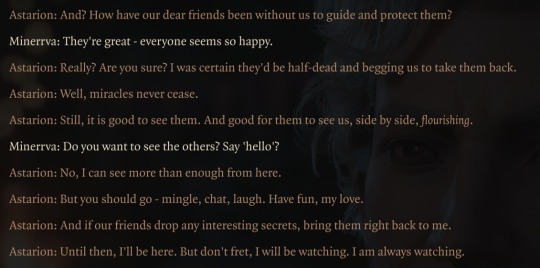
"And of course they were recognized by their scarlet and crimson scaled hides" self explanatory really ~
"The vanity of red dragons was often revealed in their prideful postures and the looks of disdain with which they regarded all others"
"To have is nothing, to keep is all."
"In fact, in many ways, they were most like hoursecats" I had to add this, it's too funny
Okay I'm stopping here because This will be massive if I don't shut up. We can replace "red dragons" with Astarion and it would fit perfectly. I'm leaving you guys the link for the red dragon wiki, have fun with it ~
https://forgottenrealms.fandom.com/wiki/Red_dragon
#astarion#baldur's gate 3#bg3#ascended astarion#vampire lord astarion#baldurs gate 3#baldurs gate#baldur's gate astarion#astarion ancunin#bg3 spoilers#baldur's gate iii#mims posts ~#bg3 angst#bg3 analysis
524 notes
·
View notes
Text
simon walker and astarion: two parallels


astarion and simon’s stories are both ultimately a tale of two traumatized people navigating grief and pain, hellbent on punishing the ones responsible for their pain.
both of these individuals have a choice: they can either heal, process what they have gone through and focus on moving on, or they can become so consumed by their obsession with revenge that they lose themselves completely and become abusers.
they exist on a morality seesaw of sorts. neither of them are inherently bad people, they’re complicated people, but their circumstances have put them in a headspace where they are willing and frequently make bad choices, often hurting others in the process, both intentionally and in the fallout.
they use their bodies as a form of manipulation. astarion tends to do this in general, but we see it more explicitly in his relationship with tav, and with simon we see him do this with both brendan and cheryl. they don’t consider or care that it may not be something they want to do, they just simply do it.
with both ascended astarion and simon, we watch as these characters become more and more untethered, and go from being just complicated messy individuals, to awful people who go out of their way to harm others, losing their connection with the world and the people around them. they have no foresight, no sense of self, they are completely dedicated to their goal of wanting to see the one that hurt them punished.
a!astarion and 2013 simon are both obviously much more nuanced than this, it isn’t just a situation of them being bad people and that’s it, but that’s a bit more than i can get into in one tumblr post.
ultimately, i just think that the overall narrative of their stories are similar. they’re both tales, and even warnings, of how when you don’t allow yourself to heal, you can spiral out of control and become a person you maybe didn’t want to be, and you owe it to yourself to allow yourself be helped.
62 notes
·
View notes
Text
Astarion's little look to the right thing
A little something I noticed when researching for Whither is thy beloved gone?
In moments when he's being vulnerable, he looks away and to his right. I always assumed this was a spawn thing.
*It's not just to the right. He looks to the left when asked what you two are in act 3. In act 2, he looks everywhere.

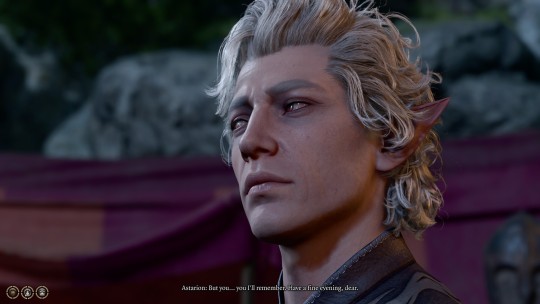
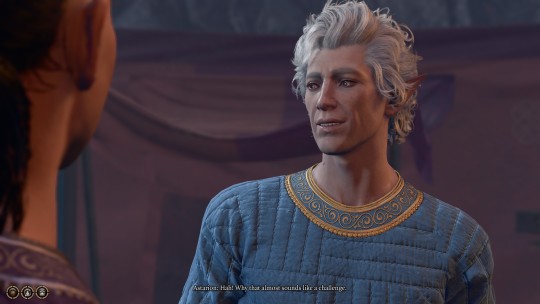
BUT.
This is a conversation you have after breaking up with AA.
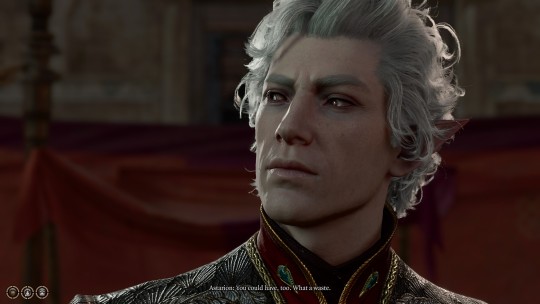
Not going to make any judgments on the sincerity of AA here. That's always up to you. But still, interesting.
Disclaimer: I normally don't do the AA route and speedran it, so I may have missed more stuff.
#astarion#astarion baldurs gate#astarion ancunin#astarion bg3#astarion romance#ascended astarion#vampire ascendant#bg3 astarion#bg3 analysis#astarion analysis#baldurs gate astarion
248 notes
·
View notes
Text
This is just a thought I had and in no way do I think this is canon or what actually happens in game. But given the fact that the rite of profane ascension is basically just true vampirism with extra steps and benefits, but doesn't have any personality or corruption baked in (besides the understanding that power corrupts and how vampires act in general in DnD). What if, after gaining this power, Astarion doesn't really know what to do with it, so he just plays the part of a powerful vampiric lord. He talks about all the shit vamps can do like running wrongside on rooftops, and in the moment he seems almost kinda nerdy about it imo. He doesn't directly copy Cazador, but he is the only example he has seen. The performative voice, the ambitions, all that jazz. But it's still Astarion just being very overhwelmed with what he has done and all he has gained/lost. And eventually, he settles down and the performative nature slips with time. Or it gets worse as his partner/companions encourage his bad behaviour. Idk about you guys but after analyzing an ungodly amount of A!A dialogue I'm still under the impression that it's just a very confused and overwhelmed Astarion. Who is using his new talents to cope with his life changing in a matter of moments. He's terrified. And his partner/friends can either continue to support him, or confirm what he is so afraid of, that he is just a monster that nobody can stand to be around. If you break up with him or not romance him at all, in the epilogue it's clear he's seems very...Lonely. All that power and nobody to share it with. Nobody by his side. And if you do stay with him and support him. He seems almost surprised. But is very happy and says the player completes him. That all this would mean nothing if they weren't there. He has no reason to lie, they're with him. I think he's being actually very vulnerable in that moment. It's still Astarion.
Just an interesting view on things :3
#again I'm NOT saying this is canon#I could be completely wrong#ascended astarion#ascended astarion analysis#baldur's gate 3#bg3#baldurs gate 3#bg3 astarion#astarion ancunin#astarion baldurs gate
188 notes
·
View notes
Text
The Curious Case of Halsin and Astarion's Ascension
For anyone who's occasionally poked around my stuff, you probably know that I found my Evil run of Baldur's Gate 3 (by which I mean my selfish run where I tried to gain as much power, wealth, and companion trust as I could) to be my most satisfying thus far. Part of that was the unique experience of having Halsin ask to join Tav and Astarion's relationship post-Ascension.
At the time, I said yes because it made sense for my character to "collect" an Archdruid. Out of character, I was tickled by the idea that Halsin confessed after Astarion became the new biggest bad in the land. Halsin was supposed to be a Good guy. Surely, either a possessive Astarion would be spitting mad about the arrangement, or Halsin would have second thoughts about Mr. Vampire Ascendent once he got a taste. I was ready for the drama.
It never came. In fact, the glimpses of their dynamic were so comfortable and playful that I was shocked.
Since then I've been doing a lot of thinking about Halsin and why he might act how he does throughout the Ascension storyline. I realize most of this can be handwaved with 'fanservicey romance writing.' That's true for parts of all romance paths, honestly, and I don't consider it a wholly bad thing given the game's goal to make you its center. However, I think being dismissive of the writing is not as much fun as building headcanons that work with any set of behaviors or lines you get.
So enjoy some theories pulled from datamined dialogue and my personal games. As always, this is completely hypothetical - I encourage everyone to write 'canon' in their personal playthroughs however they prefer.
Note: it's impossible to get all these lines in a single run due to some hinging on Astarion leaving and some may be bugged or near impossible to trigger. They're just being used to explore a character and dynamic that I don't see much of around fan spaces.
Halsin on the value of lives
To briefly set the stage, it's important to understand how Halsin views life and justice. He spells it out rather clearly if Kagha kills Arabella and her parents are also dead.
Halsin doesn't consider himself to be an arbiter of good and evil, only a steward of nature and its Balance. He highly values life. However, it's not him, the leader of the Grove, who is ultimately responsible for deciding Kagha's fate; it's the wronged parties or, barring that, nature itself who should decide her true punishment.
Halsin: As for the idol? It's nothing compared to a life. A mere object, next to one of nature's creations. I cannot absolve you, even if you are repentant. The girl's parents should have decided your fate, but they perished. Instead, nature will judge you. You are banished from this place - banished from everywhere the Oak Father's creations thrive.
But valuing the sanctity of life doesn't mean he doesn't also understand the importance of sacrifice. For example, if Wyll chooses his freedom over his father, Halsin counsels that it's a necessity to sacrifice to grow at times, no matter how unpleasant.
Halsin: You made a hard choice, Wyll. But not one that is unknown in nature. At times, a seedling must strangle the very tree that bore it, if it is to survive.
The price of 7000
So, Halsin's not a big fan of sacrificing life, yet understands that sometimes, people need to die for others to thrive.
But what about 7000 lives? A whole village worth?
That level of sacrifice sounds an awful lot like the day his life was destroyed by Ketheric and the Shadow Curse. A horrible event that haunted his every thought and deed for the next 100 years.
Within this context, it makes sense that all of his responses during the Ascension, whether Astarion does it or not, are focused on the price being paid. He usually emphasizes the sheer number of people affected and never discusses Astarion's potential evil (more on that later) or the undead nature of those lives.
Halsin: Stay your hand, Astarion. To sacrifice so many is a tyrant's ambition.
Halsin: All those lives snuffed out, just to grasp some power. That was craven - unnatural.
Halsin: Astarion resisted the allure of Cazador's would-be powers - and I am glad of it. Whatever he would have gained would have come at a great price.
The interesting part about this is, as an Archdruid of Silvanus, those undead lives should be considered an abomination. The Oath of Ancients oath break if you free the spawn reminds us of this. So Halsin's advice to save the spawn is not necessarily druidic advice - it is a personal opinion wrapped in flimsy druidic justifications.
He even recognizes undead as unnatural when you enter Cazador's home:
Halsin: A lair of undeath - most unnatural. We must tread carefully.
Yet about the spawn, who are undead and an intimate part of that unnaturalness, he says this about releasing them:
Halsin: Good - they deserve a chance at life. Nature will handle their fates from here.
Mercy for all monsters?
This is interesting to compare to another encounter with a smaller version of an eerily similar choice in Act III. The mindflayer in the Windmill - a person turned into a monster, much like a spawn. Allow it to live, and it may devour a family. In that case, Halsin says:
Halsin: We allowed this unnatural thing to live - now a whole family's worth of blood is on our hands.
He joins a host of other Good companions who curse themselves for showing mercy where it wasn't warranted. These are largely the same companions who would also save the spawn.
Karlach: This is our fault. These people died because of us. What were we thinking?
Wyll: Justice does not entail granting mercy to monsters. We should not have let this abomination go free.
Gale: A cruel conclusion to the mercy we showed, but hardly an unpredictable one. As long as it lives, so will its appetite.
The contradictory perspective taken during these two storylines shows the importance of emotional context in how we make decisions. For most, their traveling companion, who also has a tadpole, is the first vampire spawn they've ever met, while mindflayers have generally been the big evil this entire time. This could lead them to feel as though a horde of spawn may have enough humanity to need a chance, while a newborn Mindflayer should be exterminated on sight. Also, most of the other Good companions are relatively young and idealistic, so it makes sense that some may make foolhardy, heroic decisions.
But this encounter also begs the question: if these heroes are so distraught by having the blood of one family on their hands due to a single hungry mindflayer they saved, how could they justify letting 7000 starving monsters with unquenchable bloodlust free? Are they simply kind-hearted and short-sighted? Or maybe they're only optimistic about the hunger of vampire spawn, despite having personal examples of both a spawn and a mindflayer who manage their hunger equally ethically - by feeding on enemies and criminals.
Their naivety is driven home by Jaheira not being moved by the mindflayer or the spawn due to her extensive life experience. She believes in both cases that the greater mercy is to kill the creatures now.
(About the spawn) Jaheira: And what of the living they'll feast on, should they not prove as admirable as Astarion? They deserve a chance, too.
(About mindflayer) Jaheira: Look well. Our stupidity. Our price to pay.
Halsin is even older. He's a devout druid. He recognizes undead as unnatural. By all accounts, he should be on the same page as Jaheira to preserve the Balance. Yet in the face of that, he still advises to give the spawn a chance to live free, likely wreaking havoc wherever they need to feed.
I like to think this strange blind spot in his doctrine is due to a combination of Astarion's presence humanizing the unknown spawn, therefore making their unlives worthy of protection, and his own history as a genocide survivor creating an emotional reaction strong enough to override his usual wisdom. The price of a village is simply too devastating and personal for him to condone. No matter what letting 7000 ravenous undead free may mean.
Making the price worth it
Once you've ascended Astarion, you may be surprised that Halsin - generally a good man - is now steadfastly on Astarion's side. His reactions to the Gur conflict highlight this. If you side with Astarion against them, he's not happy, but resolute.
Halsin: An unfortunate battle... but I must stand by those I count as allies.
And if you decide Astarion is evil now and side with the Gur, Halsin doesn't seem to care about what Astarion has become, only that you allowed the sacrifice to happen and then let it go to waste:
Halsin: We allowed Astarion to sacrifice so many, only to just turn on him soon after? We should have stopped him sooner.
In contrast, many other companions call Ascended Astarion a monster, evil, or maniacal if you turn on him. They believe killing him at that point was the only right answer.
Karlach: It's done. It had to be done. Astarion was... out of control. Gods dammit. Look, he was an evil leech, but he was ours. I thought he'd changed. I was wrong. I always am these days.
Minsc: Do not mourn Astarion. The Gur are known to be a just and righteous people among the Rashemaar. They named Astarion monster, and so monster he was. Yes, Boo - even if he sometimes seemed a friend.
Gale: That's one scourge eliminated. A vampire with that much power would be a death sentence for this city. A pity Astarion didn't understand that. Or rather, didn't care.
Lae'zel: Astarion proved himself no less maniacal than his master. His death was a favour - to him, to us, and to the city.
Wyll: Hunt the monsters of the Sword Coast, protect the people - that was my promise. Killing Astarion was the right thing to do. I have to believe that. But I'm not proud of it. Not after... all this.
Ignoring Astarion's evil and telling you that you shouldn't have betrayed him may seem odd for a character who usually has a strong moral compass. Especially since Halsin doesn't tell you that you shouldn't have betrayed Shadowheart if you choose that path, though he's wary of that decision since you're handing her over to Sharrans. However, if Halsin's focus is on the 7000 lives and not on Astarion's personal kindness or cruelty, it makes more sense.
The people are gone. There is no taking back all those lost. So he's left with the need to make their sacrifice something other than a meaningless slaughter. The power for his companion must be worth it.
Halsin on Evil Astarion
You may be thinking, "Okay, but even if it's all about the mass sacrifice mimicking his own horrific past, shouldn't he still care about Astarion being Evil? He doesn't like evil acts at all!"
That's mostly true. Halsin certainly hates Shar for personal reasons and can get upset when you do cruel things. However, he's also potentially had a bit of a soft spot for Astarion since Act I, when you can decide the vampire spawn is evil and kill him or kick him out of camp.
His lines for this are actually shared with Karlach, Wyll, and Jaheira, according to the data. The uniqueness is primarily in his distraught line delivery.
If you kill Astarion, Halsin admits that he liked the guy even though he was a killer:
Halsin: Rest in peace, Astarion. You may have been a blood-thirsty murderer, but I liked you all the same.
And if you send him away, Halsin says this about Astarion being alone in the woods:
Halsin: He's someone else's problem now, anyway. Woods are full of boars. Maybe he'll learn his lesson and start hunting something that won't miss him when he goes.
His camp reactions immediately after Ascension mirror this attitude of concern rather than condemnation of evil. If Halsin speaks directly to Astarion, he sounds exasperated (the way Halsin says his name always makes me snicker) while Halsin once again brings up the idea of the price being paid.
Halsin: Astarion... you have ascended amongst the ranks of the undead. I can only hope that you do not come to regret the price that you paid.
However, the almost identical line if he's talking to another player character is delivered differently, particularly in how he says Astarion's name. It's more concerned than judgmental, implying that his frustration with Astarion is coming from a place of worry rather than pure anger.
Halsin: Astarion... he has ascended amongst the ranks of the undead. I can only hope that he does not come to regret the price that he paid.
This is particularly notable because it's in contrast to Shadowheart, who has a very similar line after her evil choice, but the emotion behind both sounds more similar to my ear.
After that initial comment, Halsin can banter with Ascended Astarion about how he's turned the player into a vampire spawn if there's a player romance. Unlike most of the other companions who can comment, such as Wyll and Gale, he expresses worry for both of them, not just the player. He also explicitly explains he has no intention of kink-shaming them, just warns about how dangerous having a master/thrall relationship can be if made real.
Halsin: To give oneself wholly, and to have a lover totally in your thrall...? A harmless game, until it becomes real. I worry for the two of you, Astarion. For your sake, I hope some of it is just a fantasy, deep in your heart.
But perhaps the most blatantly accepting we see him of Ascended Astarion is if they go to the Drow twins together. There are always some playful lines with one another if they're both present, but one is unique to Ascension if the player bites Halsin as a spawn during the scene. Halsin's response is light and delighted, acknowledging Astarion's role as not just a vampire, but the lead in your new relationship.
Halsin: Ha - tickles. See what a bad influence you are, Astarion?
Combine with Halsin's direct propositioning of Astarion if Astarion teases him about his night with the player, and there's a case for long-held attraction as well, regardless of alignment.
Astarion: I hear things got wild between you two. I hope no one was too badly mauled. Halsin: We're all in one piece. Perhaps you'll join us next time. Astarion: It's bad enough having one person with fangs trying to keep control of themselves. Two of us could be dangerous.
All these lines, taken together during times when others label Astarion a monster, suggest that Halsin accepts Astarion as a whole. He doesn't believe in trying to change people's nature, so maybe he sees any distasteful deeds as part of Astarion's, the same as an owlbear cub eating its mother might disgust some though it is completely natural.
It makes sense, then, that Halsin might be proud of Astarion for choosing morality or personal growth, but he isn't too bothered if that doesn't happen either. What line Astarion would have to cross to earn Halsin's true ire is unknown. The reverse is a much more complicated question (mostly because it's plausible that many of Astarion's lines are rooted in deception) that I may delve into another time.
Is this whole relationship a little ironic given that Halsin is The Selfless Good Druid and Astarion is The Selfish Evil Undead? Absolutely. But that's the fun of it, in my opinion. It adds depth to these characters in ways that rarely shine through during a singular playthrough, especially since very few will do the crazy thing I did with an Ascended Astarion + Halsin romance.
It sure makes for narrative fun, though.
185 notes
·
View notes
Text

No matter how much you try to hide it, the crippling fear of abandonment is all too obvious in you🫵
Astarion, at his very core, is scared, and even ascended it's all too apparent. No matter how much he tries to cover his fear with the veneer of confidence and control, he wants to be wanted, to be needed. So he wants to have control over you, so that you would never even think of leaving him.
In other words: Ascended Astarion is very very yucky and tragic and I hate him but can't help but pity him :(
#baldur's gate 3#bg3#bg3 astarion#ascended astarion#astarion#astarion ancunin#dragging ascended astarion is my favorite hobby#back to being a spawn you go🫵👉 x2#first karlach and now my durge i can't stand him being so horrible to them :(#disclaimer: this is not serious character hate! i did not intend to offend astarion's fans; i love him too!#it's just my analysis of his character and what drives him to do what he does#the fandom is an open space for different interpretations of characters🙏 and my interpretation is not a personal attack on yours!#this post is just me pointing at him and saying “yucky you” please don't take this very seriously 🥹
22 notes
·
View notes
Text
The parallels in the epilogue between Ascendant Astarion's "I'm always watching" and Spawn Astarion's "I'll always be here, my love" hit me so hard

#a man of true duality#i could write a whole essay about it#bg3#baldur's gate 3#astarion#bg3 astarion#astarion ancunin#astarion analysis#ascendant astarion
198 notes
·
View notes
Text
I can’t believe it’s come to the point of analyzing Cazador for all of you, but considering the amount of “Cazador can be redeemed!” And “Cazador x reader” I’ve seen, I feel like i need to make this.
So you feel pity for Cazador because he also suffered at the hands of his master. Good. That’s the point. You should feel something for Cazador, he also suffered abuse, and was dragged into the cycle of it by Vellioth. It’s awful, it’s terrible, but it doesn’t mean he’s redeemable.
Very much so, when Cazador kills Vellioth and chooses to start the cycle of power and abuse over again, he was too far gone. He made the choice, the conscious choice to be the same as his old master. Of course he’s suffering internally, somewhere is the soul of someone who lost everything, and became something awful. However he doesn’t even say he wishes for a reset. He wishes for death. Only in death is he free of the cycle of abuse, for his role in it is too far gone at this point.
“Orin and Gortash have apologists!” They do, but they’re also under different circumstances. It’s also justifiable to absolutely hate Orin and Gortash (believe me, even as someone who believes Gortash could’ve been better, I killed him in my initial run). Specifically as the Dark Urge, you can tell Orin that she’s being used just as Kethric and Gortash were. She’ll even break down as if she’s realizing that all this death she’s done in the name of her father/for her God, has been her being taken advantage of. Though she never gets a chance to be better, because she’s forcibly transformed in this ending, it’s just a sneak peak of what could have been. She was being used, and while it doesn’t erase or justify ANYTHING she did (and you’re well within your right, and should hold her accountable), it at least gives the player insight on to what could have been.
Likewise with Gortash, a victim of abuse at the hands of Raphael, with canonical lines on how he was beaten in the House of Hope as a little boy. His own parents sold him out, and he ended up being so desperate to be bigger, to have more power, that he also let himself be used, and in turn lost everything he worked hard for (and sold out Karlach, which is absolutely unforgivable of course). However he wasn’t too far gone. You can see his loyalty to you depending what options you pick, and although death is his inevitable end, it still shows that there was still a person inside.
There wasn’t a person in Cazador anymore. He was trapped behind the wall of abuse that he continued, and refused to even acknowledge it, or try and see reason. Perhaps it wasn’t possible for him, but ultimately his actions brought him here. Those that say Ascension for Astarion would free him of those chains, are simply wrong. Why does Astarion deserve to live, anymore than his siblings? Or the seven thousand people who were turned against their will? Of course Astarion is more, controlled in his hunger—but so are his siblings. Even speaking to them after the fight they’ll all vow and attest that they can control themselves, and they’ll even help the others if brought to it.
Ascended Astarion picks up the abuse cycle, killing thousands of people with just his first command. Ascended Astarion no longer speaks to you, but instead at you. You’re his “favorite” spawn, but then again Cazador had favorites didn’t he? And all of them suffered just as badly as the rest. Ascended Astarion even mentions “covering the world in darkness for his spawn”, which shows him continuing the abusive cycle that got Cazador in the first place.
Cazador dying, and spawn Astarion choosing to break the cycle is the significant ending. The best ending for Cazador, the only one for him, is to let him die. He’s a horrible, cruel, bitter man, and any sense of his humanity died long ago. Only in his dreams is there anything left, and he’s too cut off to even reach them anymore.
We also know that the Szarr’s had family. There are relatives to Cazador (see his niece), and clearly it wouldn’t have been wrong of him as a vampire to have a family if he so chose. But he didn’t seek out a partner, like some of his other (vampire) relatives did. He chose to only live by his spawn, whom he considered his children, showing that he truly didn’t see a need for a partner. Themes of family are a vital part of his story, but the element of a romantic partner never has been.
TLDR—Some villains in this game are understood, and potentially redeemable if given the option. Cazador is not one of them.
#I am VERY much a Cazador hater btw#but analysis is the only thing people understand#bg3#baldur's gate 3#baldurs gate 3#baldurs gate#astarion#bg3 astarion#astarion bg3#baldurs gate iii#baldurs gate astarion#astarion baldurs gate#vampire spawn bg3#cazador szarr#baldurs gate 3 cazador#cazador#cazador bg3#bg3 cazador#anti ascended astarion#ascended astarion#orin#orin the red#lord gortash#gortash
287 notes
·
View notes
Text
Astarion and Vampire Supremacy.
In general and in romance.
In DnD, vampires are huge supremacists. They consider themselves superior to any undead and certainly superior to mortals. All mortals are cattle to vampires.
In Baldur's Gate 3, this trait is also present in vampire culture.
In Astarion there seems to be almost no such things… Or they are not emphasised - as I think they are.
In my opinion we should have explored his different traits.
Vampire Supremacy is one of them.


Astarion was an Upper City noble and the chances that he wasn't arrogant towards the "lower classes" are very low. Zero for me.
So he was already familiar with supremacism very well.
Add to that the loss of his status and the hierarchy of the coven in which he became a slave.
That's something.
We barely have conversations with Astarion about vampire culture: what does it mean to be in "vampire coven"? How vampires relate to the mortal world? And what does he like about the vampire world?
It's more shadowy moments.
Here I found a few.
Part 1. Details in the story.
EA 9 patch, Act 1 - the grove, after killing Nettie.
It's one of those cut out scenes with little companion comments and reduced to a one line or remade. Shadowheart had it too :<
Now:

Act 2 - after killing the strange ox.
Act 3 - Astarion as Lord says his stuff :D
This word: "spook" cattle/sheep...
It's same edge of his character.
In Act 1, you'd think he thinks all "weak" people are sheep. That's true, too. Nettie has lost, she's dead and she's a sheep, but somewhere around here in the grove there will be a hunter for him and Tav - they have to go.
In Act 3, the path of evil, Astarion demonstrates this line deeper and more vividly.
In Act 2, it still sounds like something funny, comical. Yes, yes chickens, oxen and people.
But these are food animals - and that's not such a joke to Astarion.
To put it in perspective in Act 1 all his companions is a snack.
He discusses with Tav what they would taste like. Here's the synopsis for that scene:
Synopsis: Astarion is staring at the other companions around the campfire. He's friendly and affable, but his mind is on his hunger. He starts to wonder what the others taste like, although he's MOSTLY joking. In the end he decides to remove himself, before the conversation gets too real.
Mostly a joke that could become something serious.

Vampiric arrogance, predatory nature.
Vampires are clever hunters - their arrogance towards mortals comes in many forms, from food to merry carnage to lust. Basically, they use whatever gives them profit and pleasure.
He might not eat Laezel, but watching Lae and Shadowheart fight is entertainment for him.


Looks fun, but the nature of it is dark.
It can be taken ironically, but he really enjoys watching brutal fighting and generally killing.
It's a trait. Deserves its own post.

WYR_SmugglersCave_PAD_Suggestions
He do hope.
It's also relevant to mortals. Corrupt people with power are as parasitic creatures as vampires. Instead of blood, it's gold, work, and entertainment in an wicked way that damages people.
In this I notice the metaphorical nature of vampirism in Astarion's character.
As an example of corruption I recall Astarion's little remark when we kill the two ogre-lovers of the barn.


The insignificance (who cares about two ogres) and again the comicality of the situation, the way Astarion smiles as he opens the barn is legendary. Kind of hides it a little bit and takes it away from the thought…
Somewhere in Baldur's Gate someone is paying gold to watch fights, and it's unlikely these fights have civilized rules. And it's doubtful that such a entertainment would only apply to ogres.
The fighting pits at Baldur's Gate.
Who knows if Astarion was interested in that when he was mortal. I headcanon that he was. He was extremely corrupted and it's deep in his personality.
Here is this telling facet, Astarion's interest in such brutal things, which are as much in the shadows as gremlin remarks, yet there is exactly "evil" in this one.
This part of that aspect:
The arrogance of the Noble and the Vampire.
More points about treating people like cattle.
There is a moment in Act 2 - and I have absolutely no idea where it is.
SHA_Mausoleum_PAD_MakeshiftVessel
Players find a vessel with a half-formed humanoid shape gestating inside and reacts accordingly. The being is just inert flesh and cannot speak.
How to trigger:
Interact with S_SHA_Mausoleum_MakeshiftVessel.
Where is that thing? I can't find.

In good companions, this is a cause for concern. In general the place where they found it contributes to very unpleasant thoughts.
A mausoleum in the shadow lands of Sharr, where a necromancer and the chosen of Myrkul struts around.
Well, Astarion too, as you can see... finds a downside.
Hunting people is fun and keeps you in the spirit.
It's a good idea to check all the phrases in Astarion's Original throughout the acts. Maybe there's more.
I watched the epilogue of Lord Astarion Original and in a conversation with Minthara (hah, who else?)

And it's wild. It's literally all about the people.
:D
We have a few to choose from for rpg's.
And given the line about sports… I really don't think Astarion will be buying "food" very often.
Or that pale arse is lazy after all and his hunt is a park in the city. And when he should be setting up his power web in the city, he's too busy for hunting.
Can you imagine him wanting to hunt and get some air, but he's got some lordish business in the halls until late in the evening.
Part 2. In Romamce.
This part departs from such direct things as blood and the predator's attitude towards people.
It becomes more sensual.
I would say this trait of supremacism is slightly visible, but not over people, over mortality in a greater sense, when Astarion turns Tav:
he emphasises the strength, sharpness. Better.
The morning after the turn.






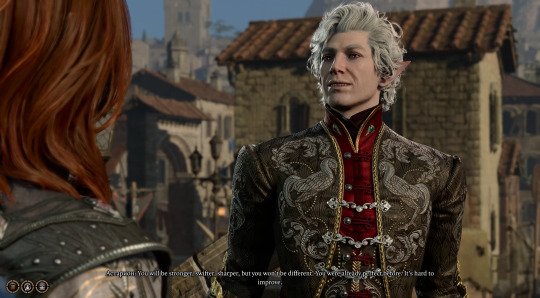
He has a point. The last time he was mortal, he was killed.
Astarion as Lord does the same with God Gale Original mentioning immortality as - strength, lack of illness and youthfulness.
love this one

His vampiric arrogance over Tav perhaps visible only in the first act. He didn't really care. Tav became his fun, his lust, and his way to survive.
Then Tav is the first person to care about him in dozens and dozens of years of slavery.
"Blood bags" and such are a bit of dark humour, so it might have been true in another life, but he and Tav are far from it, they're the first person he's cared for in decades of loneliness.
His perception of mortality as something that makes a person more vulnerable is his trigger (among others) for turning Tav into a his kind.
But since he's not in such a hurry in the end of mortal Tav, I'm guessing: it's his euphoric state after the ritual, where his spire for the castle of vampire happiness is to be with Tav forever. He chillin' about it, afterward.
Tav's immortality is a nice thing he'd like, but okay it can wait.
So.
Tav... they're special. The two of them are special. Astarion elevates Tav and himself above the others. We are Better.

Camp. Vampire ambush.
When the camp is ambushed by spawns.
If Tav proposes the idea that the world is actually a wonderful place that can accept him - he argues with them.
But approves of all three different reactions.
Also then Astarion says the word "forever" in regards to their relationship, to Tav.
This "forever" part is deep in Astarion.
According to the artbook (The artbook is EA era, which is still sold with the game though, and the story doesn't contradict anything) So according to the artbook Astarion was obsessed with eternal life, forever youth, forever being.
It extends to his feelings - it's needed forever. It's very sensual, but also very greedy and… painfully understandable - it's such a simple feeling to make something nice continue for as long as possible.
If Tav is on the same page as Astarion and tends towards the "only loved ones matter, we're special" mindset.
You'd think it was his trick-manipulation to perform a ritual, praise Tav for supporting his idea of supremacism and get what he so reasonably needs.
He's certainly glad that Tav has similar ideas to him, and he'll definitely support that.
It doesn't depend on his goals still - his "we are better" is very direct and deep in his personality.



Italicized.
Here we are. That's one of the key thoughts in his character. That's the focus.
This trait is further seen in Astarion as Lord - he says "We", "Ours".
The man even says it in Latin. Aeterna amantes.




New in patch 7, takeover of the Absolute:

This part is already moving away from vampirism.
This one is very layered.
We are because he finally found someone he can trust.
We are because we are parts fated to complete each other.
We are because he's not alone in the world anymore.
Along with vampirism, his Noble Lord status plays a role here again.
We are the mighty, above and we rule.
It's an easy and very simple fit to vampirism - we are better and we are forever.
He's also incredibly proud of himself, that he can give something to Tav, can protect them. He's been under Tav's protection the whole journey. Undead outcaster in Faerun, they regard mortals as cattle, and mortals regard them as monsters. That's why there are monster hunters. Vampire spawn he was allowed to stay in the group and he was dependent, he couldn't be a leader. In the romance he felt he had nothing to give, he was getting Tav into trouble with a powerful true vampire. He was counting the seconds until they finally decided to leave him…
In the romance, vampirism plays into the fact that Astarion is very much immersed in thoughts of eternity together.
This emotionally intense and fragile moment: "I don't want to lose anything", comes from the very moment he lost: his status, the sun, his life. Not gonna happen again.
Vampirism in the romance have fun one too:
-- wealth - these two literally wear the most expensive clothes on the Sword Coast.
-- shared powers - he is going to be in charge
-- fights and challenge is for Tav- warrior, Astarion likes to spill some blood
-- pleasure - of various kinds, from bed to blood.
The end result is an amalgamation of his:
-- his personality with, well, a pretty intense dark triad.
I would say character image instead of personality. Because the personality is itself. But the character will always submit to the idea - recall that his core is a balance of evil and fun. And evil in DnD is egoism, immorality, narcissism, harming others for fun and personal goals and all that.
These dark parts in irl personality can spoil the balance. That's why psychology is for people.
Not for characters who will eventually never go against their core. (even if all psychology reference books say otherwise).
-- vampirism - the desire for blood and a predatory attitude
-- desire for status and power as noble
-- force as magic
-- forever
-- and share it all with love
A little bonus at the end.
Animation 3 patch. Subtle process.

This scene is much improved in colours in patch 7. But I still like the original faces. He looks so much like a fox >:3

#astarion#astarion analysis#astarion meta#lord astarion#ascended astarion#astarion ancunin#bg3 astarion#astarion bg3#astarion baldurs gate#astarion romance#astarion x tav#astarion x durge#bg3#baldurs gate 3#baldurs gate 3 patch 7#bg3 patch 7#my analysis#bg3 meta
313 notes
·
View notes
Text
Ascendant Astarion was driven by fear, but can you really blame him?
Okay so I just read the newest interview that mentioned Astarion reasoning behind his ascension was driven by fear and I thought it made sense?
Tho I don't believe that fear was the only force behind the reason of his decision to ascend, there's a longing to be alive again to enjoy everything that the world has to offer, the need for certainty and also to protect his loved ones (when he has a love interest)
But let's talk about this fear part, there are people (even the companions) who expected that 'he should have known better' or 'shouldnt even think about ascension' and sees this fear in the recent interview as something that is so horrid but here's the thing.

"You are right to be afraid." I mean DUH obviously it makes sense. Astarion lives in a very dangerous world where countless undead risen from their graves thanks to necromancer toying with life and death, there are bandits everywhere, monsters, evil gods who never failed to make life even more miserable than ever and even the supposedly good aligned god can be so awful at times, etc etc.
The party that he traveled with and himself were infected with worms that would eat their brain and transformed them into a living husk, the absolute cult and the dead three were on their tail, angry devils, Cazador wanted him back and not to mention the Githyanki and their lich queen wanted them dead as well for what happened with the prism
Even during act 3 where they were supposedly close to victory. The victory was not set in stone yet, nothing is certain and something could have gone wrong. They could have died or even worse!
Not to mention he's a man who was tormented for 200 hundred years. He was stripped of everything that he had and even his own reflection, reduced to catched rats to sustain himself.
Can you really blame him for wanting to seek a way out from Cazador's torment, the hunger for blood and the indignity that he suffered for so long?
Also it would be harder to convince him to not ascend if Tav or Durge romanced him. Because now he's not just afraid for his own safety and his future but also his lover. The only person whom he ever love and genuinely love him back in 200 years (also not ending up as a victim for Cazador)
Most people would have killed him when they found that he's a vampire and infected with an Illithid parasite. Most people would have abandoned him
Tav/Durge was the only light in his life after years of living in darkness and torment, you can't really blame him for wanting to keep this light from being snuffed out by untimely death
And if that means sacrificed 7000 souls that he already damned anyway (undead like vampire wouldn't be accepted by good aligned gods in the after life, not sure about evil gods but most deities most won't accept them) so be it
I don't see this fear behind his decision as something that is objectively awful? I mean it is a natural respond anyone would have if they were in his shoes
Then you might ask "If Astarion loves Tav or Durge that much why he insisted on turning them into a vampire? And break up if they refused?"
Because he was overwhelmed by his beating heart/ his renewed sense, the high from his power and he's also insecure. At that point in act 3 he expected Tav and Durge to stand by his side no matter what
Because they were the only person who didn't kill the parasite infested vampire spawn at the beach, who loves him anyway despite the face he was a man with nothing to his name, who were willing to sacrifice 7000 souls and killed the Gur for him!
Ascended Astarion didn't want THAT special person to be taken by early death or a fate worse than death
He needed the reassurance that his love would be safe and no gods nor fate will take them away
If they refused to be an immortal vampire then they were as good as sealed their fate to death. Astarion didn't want to face that heartbreak
The thing that I don't agree with the interview is that the interpretation that ascension sent him to a horrible place? It was kinda vague? Like worse place when? During or after the ascension? Because this cannot apply after the ascension since I have taken so many screenshot and recording of ascendant astarion and I didn't see him feeling miserable about his fate. He was happy that the hunger gone and he could see his reflection again
Post final battle? The epilogue? After the epilogue party? This cannot be applied to all people, all route, all Tav/Durge and Astarion in general because there's variations. I mean you might see ascended Astarion as a bit lonely because he doesn't end up with anyone but in my Tav's universe he has a consort who stay by his side and their relationship is still going strong because my Tav is aligned with him
#astarion#astarion ancunin#bg3 analysis#bg3 meta#bg3 discourse#ascendant astarion#baldur's gate 3#bg3#astarion x dark urge#astarion x tav#ascended astarion
143 notes
·
View notes